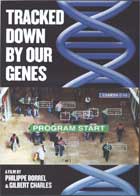
Tracked Down by Our Genes 2007
Distributed by Icarus Films, 32 Court St., 21st Floor, Brooklyn, NY 11201; 800-876-1710
Produced by Dissidents
Directed by Phillipe Borrel
DVD, color, 53 min.
Sr. High - Adult
Genetics, Biology
Date Entered: 08/06/2008
Reviewed by Erin O'Toole, Science and Technology Librarian, University of North Texas, DentonInitially, the members of a genealogy club in central France are enthusiastic about having genetic testing done by an American graduate student to determine their ancestry. That enthusiasm turns to concern when the director Phillipe Borrel discovers that their genetic information has been shared with the company, DNAPrint Genomics, which has added their data to a forensics database used to profile criminals.
The documentary, Tracked Down by Our Genes, examines the bioethics of genetic testing, with a bias against invading people’s privacy by sequencing their DNA and storing the information. The bias is revealed early in the film when the narrator refers to the amateur genealogists as “guinea pigs,” usually a derogatory term meaning someone is being experimented upon or exploited. Despite the director’s view, the advantages and disadvantages of genetic testing are presented in a fairly even-handed manner. Anthropologists, a commercial geneticist and a London detective inspector persuasively discuss the knowledge we can gain from genetic testing that will eventually protect people from disease or criminals. The police detective explains that when he sends a DNA sample from a crime scene to DNAPrint Genomics, then the company can compare the DNA sequence to its database and predict the appearance of the criminal. Halfway into the film, the opposing viewpoint is passionately presented by scientists and anti-genetic testing activists. They fear a future in which people are discriminated against by governments, employers and insurance companies based upon their genetic code, especially since current genetic tests are not highly accurate predictors of a person’s health or appearance.
The majority of this film is spent on interviews; therefore, it is appropriate for a more mature and attentive audience. There is one animated sequence of the DNA molecule, but it does not demonstrate DNA replication or the passing of chromosomes to offspring. Thus, the viewer needs a basic understanding of genetics and DNA to appreciate the film. Several of the interviewees are French, so there are subtitles for their dialogue; the subtitles are well-translated so that the English makes sense.
The documentary would pair well with the film, Ghost in Your Genes, which explains why current genetic testing is inaccurate. This second film introduces the epigenome, a network of hormones, proteins and other molecules that regulates the expression of a person’s DNA. The DNA sequence alone cannot fully predict the appearance, health or behavior of a person because environmental factors influence gene expression through the interface of the epigenome.
Tracked Down by Our Genes would be especially worthwhile for AP high school and college students who have the background in genetics and maturity to consider and discuss the ramifications of genetic testing for society.